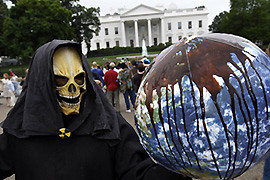
Demonstration against the BP oil disaster and the failure of the federal government to take any effective action to stop the spill and take control of the multi-national oil firm., a photo by Pan-African News Wire File Photos on Flickr.
U.S. drilling won't lower gas prices, study shows
Associated Press
Wednesday, March 21, 2012
Washington --It's the political cure-all for high gas prices: Drill here, drill now. But more U.S. drilling has not changed how deeply the gas pump drills into your wallet, according to an Associated Press statistical analysis of 36 years of data.
Political rhetoric about the blame over gas prices and the power to change them - whether Republican claims now or Democrats' charges four years ago - is not supported by cold, hard figures. And that's especially true about oil drilling in the United States. More oil production in the United States does not mean consistently lower prices at the pump.
That's because oil is a global commodity and U.S. production has only a tiny influence on supply. Factors far beyond the control of a nation or a president dictate the price of gasoline.
When you put the inflation-adjusted price of gas on the same chart as U.S. oil production since 1976, the numbers sometimes go in the same direction, sometimes in opposite directions. If drilling for more oil meant lower prices, the lines on the chart would consistently go in opposite directions. A basic statistical measure of correlation found no link between the two, and outside statistical experts confirmed those calculations.
"Drill, baby, drill has nothing to do with it," said Judith Dwarkin, chief energy economist at ITG investment research. Two other energy economists said the same thing and experts in the field have been making that observation for decades.
The statistics directly contradict the title of GOP presidential candidate Newt Gingrich's 2008 book "Drill Here, Drill Now, Pay Less," as well as the campaign-trail claims from the GOP presidential candidates.
Earlier this month, GOP front-runner Mitt Romney said of his solution to higher gas prices: "I can cut through the baloney ... and just tell him, 'Mr. President, open up drilling in the gulf, open up drilling in ANWR (the Arctic National Wildlife Refuge). Open up drilling in continental shelf, drill in North Dakota, drill in Oklahoma and Texas.' "
On Wednesday, with President Obama traveling to oil and gas production fields on federal lands, Crossroads GPS, a nonprofit arm of a super PAC supporting GOP candidates, released a new ad that accused Obama of restricting oil development in America and concludes "Bad energy policies mean energy prices we can't afford."
The AP analysis used Energy Department figures for regular unleaded gas prices adjusted for inflation to 2012 dollars, oil production and oil demand. Phil Hanser, an economist and statistician at the energy consulting firm the Brattle Group; University of South Carolina statistics Professor John Grego; New York University statistics Professor Edward Melnick and David Peterson, a retired Duke University statistics professor, looked at the analysis, ran their own calculations, including several complicated formulas, and came to the same conclusion.
When U.S. production goes up, the price of gas "is certainly not going down," Melnick said. "The data does not suggest that whatsoever."
The key, say economists, is that it's a world market.
American oil production is about 11 percent of the world's output, so even if the United States were to increase its oil production by 50 percent - that is more than drilling in the Arctic, increased public-lands and offshore drilling, and the Canadian pipeline would provide - it would at most cut gas prices by 10 percent.
http://sfgate.com/cgi-bin/article.cgi?f=/c/a/2012/03/21/MNE51NO6PT.DTL
This article appeared on page A - 7 of the San Francisco Chronicle
No comments:
Post a Comment